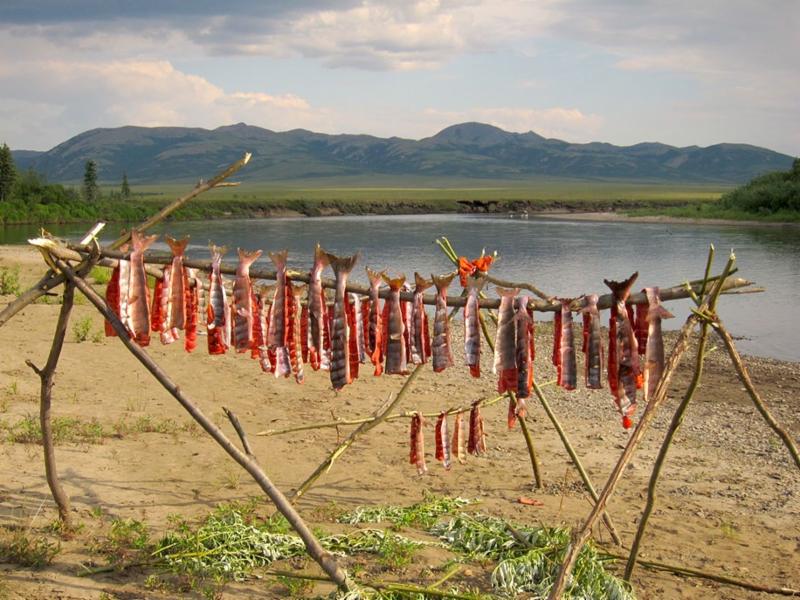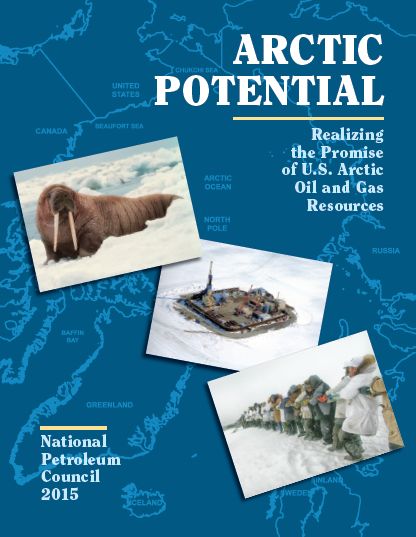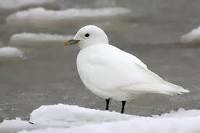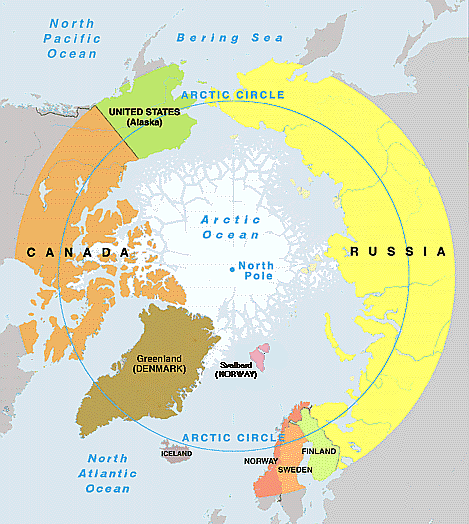|
|
|
|
|
|
|
|
 Photo Contest Winners Photo Contest Winners. The US Arctic Research Commission announces the winners of its first Observing the Arctic Photo Contest. In addition to a Grand Prize winner, six First Place winners were chosen, one for each of several categories relating to Arctic Research. These photos are displayed on the USARC website.
Special Event...

National Petroleum Council Report Briefing, April 16, 2015 (Washington, DC).
On April 16, 2015, from 2:00 to 3:00 pm, there will be a summary briefing on the recently completed National Petroleum Council (NPC) report "Arctic Potential: Realizing the Promise of US Arctic Oil and Gas Resources" by Carol Lloyd, Chair of the study's Coordinating Subcommittee, and other study leaders. The briefing will be held at the NPC office, 1625 K Street, Suite 600, Washington, DC 20006-1656. Capacity is limited, and thus RSVP is required. Please RSVP by calling Laura Alvarez at 202-393-6100 or by emailing lalvarez@npc.org. The NPC is a federally chartered and privately funded advisory committee that advises the US Secretary of Energy. BP Oil Disaster 5 Years Later, Lessons Learned? Today (Washington, D.C., USA) In advance of the 5th anniversary of the BP Oil Disaster in the Gulf of Mexico, Senator Markey, offshore drilling experts, scientists and affected locals will delve into the lingering effects of the Gulf oil spill and the looming threats posed by a lack of new safety regulations, plans for new offshore drilling, and the growing threat of climate disruption. The event takes place in the US Capitol, room S-115. Today's Congressional Action:  The House and Senate in session and expected to consider non-Arctic legislation.
|
Arctic Sea Ice Maximum Reaches Lowest Extent on Record. The National Snow and Ice Data Center (NSIDC) is part of the Cooperative Institute for Research in Environmental Sciences at the University of Colorado Boulder. NSIDC scientists provide Arctic Sea Ice News & Analysis content, with partial support from NASA. NSIDC has issued an update to Arctic Sea Ice News & Analysis describing winter sea ice conditions in the Arctic Ocean. Phys.Org
 Protecting and Strengthening Arctic Species and Ecosystems. With its harsh climate and unique living conditions, the Arctic is home to many species of flora and fauna, and plays host to many others that migrate to the region throughout the year. In recent decades, environmental stressors such as climate change, pollution, disturbances, and habitat degradation have had an impact on the very fabric of Arctic ecosystems. As such, protecting and strengthening the Arctic's ecosystems has been a priority for the Council during Canada's chairmanship. The Conservation of Arctic Flora and Fauna (CAFF) working group has completed important work to further biodiversity conservation in the Arctic. The 2013 Arctic Biodiversity Assessment (ABA) was a landmark assessment that synthesized and assessed the status and trends of biological diversity in the Arctic and provided 17 recommendations for biodiversity. To offer guidance on implementing these recommendations, CAFF has developed the Actions for Arctic Biodiversity 2013-2021: Implementing the recommendations of the ABA. This is a comprehensive action plan for implementing the recommendations from the ABA that will guide the Council's biodiversity work in the coming years. CAFF also hosted the December 2014 Arctic Biodiversity Congress in Trondheim, Norway to engage the wider Arctic community in these efforts. The Congress brought together 450 scientists, policy-makers, government officials, indigenous peoples, students, industry and civil society representatives to discuss challenges facing Arctic biodiversity and actions for conservation and sustainable use of the Arctic's living resources. Port News Protecting and Strengthening Arctic Species and Ecosystems. With its harsh climate and unique living conditions, the Arctic is home to many species of flora and fauna, and plays host to many others that migrate to the region throughout the year. In recent decades, environmental stressors such as climate change, pollution, disturbances, and habitat degradation have had an impact on the very fabric of Arctic ecosystems. As such, protecting and strengthening the Arctic's ecosystems has been a priority for the Council during Canada's chairmanship. The Conservation of Arctic Flora and Fauna (CAFF) working group has completed important work to further biodiversity conservation in the Arctic. The 2013 Arctic Biodiversity Assessment (ABA) was a landmark assessment that synthesized and assessed the status and trends of biological diversity in the Arctic and provided 17 recommendations for biodiversity. To offer guidance on implementing these recommendations, CAFF has developed the Actions for Arctic Biodiversity 2013-2021: Implementing the recommendations of the ABA. This is a comprehensive action plan for implementing the recommendations from the ABA that will guide the Council's biodiversity work in the coming years. CAFF also hosted the December 2014 Arctic Biodiversity Congress in Trondheim, Norway to engage the wider Arctic community in these efforts. The Congress brought together 450 scientists, policy-makers, government officials, indigenous peoples, students, industry and civil society representatives to discuss challenges facing Arctic biodiversity and actions for conservation and sustainable use of the Arctic's living resources. Port News
US Admiral Warns About China, Russia Presence in Pacific. Speaking to the House Armed Services Committee on Wednesday, Locklear said Beijing wants to deploy long-range radar and advanced missile systems on the South China Sea in order to exert more influence over the area. He said China has several construction projects at eight outposts in the Paracel and Spratly island chains and one of them is an airfield at Fiery Cross Reef. PressTV
Western Researchers Tasked With Mapping Canadian Arctic from Space. Researchers at Western University, in partnership with the Canadian Space Agency, are included in a two-year $700,000 grant being spent on developing innovative uses for Canada's world-renowned Earth observation satellite, RADARSAT-2. The Science and Operational Applications Research program (SOAR), a partnership between the satellite's builders, MacDonald, Dettwiler and Associates Ltd., the Canadian government and Natural Resources Canada's Centre for Remote Sensing, announced the grant in March. The Londoner
 Seal Ban Undermines EU Credibility in Arctic. Each year, the leadership of the West Nordic Council meets with a delegation from the EU to discuss its policies that affect our member countries: the Faroe Islands, Greenland and Iceland. On the agenda for this year's meeting, which took place on March 26 in Brussels: the development and the activities of the West Nordic Council and the EU, the Arctic, the environment and, not least, the EU's ban on seal imports. Arctic Journal Seal Ban Undermines EU Credibility in Arctic. Each year, the leadership of the West Nordic Council meets with a delegation from the EU to discuss its policies that affect our member countries: the Faroe Islands, Greenland and Iceland. On the agenda for this year's meeting, which took place on March 26 in Brussels: the development and the activities of the West Nordic Council and the EU, the Arctic, the environment and, not least, the EU's ban on seal imports. Arctic Journal
 Panelists Discuss the Way Forward in the Arctic. A mix of experts drawn from the military, maritime, diplomatic, scientific and history fields joined together for an "Arctic Leadership, Partnership & Polar Region Capability" roundtable April 15 to furnish a packed audience with thought-provoking facts and encouraging prospects drawn from their work and experience today in the region. The event's moderator, Gary C. Rasicot, director of the U.S. Coast Guard's Marine Transportation System, discussed his own Arctic-based work on behalf of the service that will involve establishing an international Arctic Coast Guard Forum, and introduced the roundtable speakers. The panel included retired Coast Guard Adm. Robert J. Papp Jr., U.S. special representative for the Arctic, U.S. Department of State; Rear Adm. William C. McQuilkin, director, Strategy & Policy Division; Vice Adm. Michael S. Devany, deputy undersecretary for Operations at the National Oceanic & Atmospheric Administration (NOAA); Dr. Kelly Faulkner, director, Division of Polar Programs at the National Science Foundation (NSF); Rear Adm. Jonathan W. White, Oceanographer & Navigator of the Navy, and director of the Navy's Space and Maritime Domain Awareness; and Vice Adm. Charles D. Michel, the Coast Guard's deputy commandant for Operations. Sea Power Magazine Panelists Discuss the Way Forward in the Arctic. A mix of experts drawn from the military, maritime, diplomatic, scientific and history fields joined together for an "Arctic Leadership, Partnership & Polar Region Capability" roundtable April 15 to furnish a packed audience with thought-provoking facts and encouraging prospects drawn from their work and experience today in the region. The event's moderator, Gary C. Rasicot, director of the U.S. Coast Guard's Marine Transportation System, discussed his own Arctic-based work on behalf of the service that will involve establishing an international Arctic Coast Guard Forum, and introduced the roundtable speakers. The panel included retired Coast Guard Adm. Robert J. Papp Jr., U.S. special representative for the Arctic, U.S. Department of State; Rear Adm. William C. McQuilkin, director, Strategy & Policy Division; Vice Adm. Michael S. Devany, deputy undersecretary for Operations at the National Oceanic & Atmospheric Administration (NOAA); Dr. Kelly Faulkner, director, Division of Polar Programs at the National Science Foundation (NSF); Rear Adm. Jonathan W. White, Oceanographer & Navigator of the Navy, and director of the Navy's Space and Maritime Domain Awareness; and Vice Adm. Charles D. Michel, the Coast Guard's deputy commandant for Operations. Sea Power Magazine
[Opinion] Draft Rules for Arctic Ocean Drilling: A Good Start With Room for Improvement. As industry prepares to drill in the Arctic Ocean this summer, it is critical to ensure that disasters such as the Deepwater Horizon oil spill in the Gulf of Mexico and the Kulluk drill rig grounding near Kodiak do not happen. In February, the Interior Department released draft Arctic-specific regulations for exploration drilling in the federal waters of the ecologically rich Chukchi and Beaufort seas. Although these regulations would not prevent every problem that could arise, they are an excellent first step to ensure that drilling operators and their contractors are Arctic-ready. Having clear and established requirements also provides regulatory certainty for all companies operating in the U.S. Arctic and places the companies on equal footing. Alaska Dispatch News
|
|
Legislative Action
HR 1826, to reauthorize the Magnuson-Stevens Fishery Conservation and Management Act (Introduced and referred to the House Resources Committee)
|
|
Future Events
Arctic Matters: The Global Connection to Changes in the Arctic, April 17, 2015 (Webinar, EDT). Join a panel of Arctic experts for a webinar to explore a new booklet that introduces the threats and opportunities of the Arctic's rapidly changing environment and explains why the Arctic matters - to all of us.
Viewed in satellite images as a jagged white coat draped over the top of the globe, the high Arctic appears distant and isolated. But even if you don't live there, don't do business there, and will never travel there, you are closer to the Arctic than you think.
The Road to Iqaluit: The Arctic Agenda on the Eve of the US Chairmanship, April 17, 2015 (Washington, DC). On April 24-25, 2015, Secretary of State John Kerry, his fellow Arctic Council Foreign Ministers and indigenous representatives will gather in Iqaluit, Canada when, at the conclusion of the ministerial meeting, the United States will assume its two-year chairmanship of the Arctic Council. The United States has outlined an ambitious chairmanship agenda to include a strong focus on addressing the effects of climate change, particularly the impacts of pollutants; improving ocean stewardship and maritime safety; and improving the health and well-being for those who live in the Arctic region. With event sponsored by the Center for Strategic and International Studies will have keynote remarks by Senator Lisa Murkowski followed by a discussion on the future of offshore energy development in the American Arctic based on the recent release of the National Petroleum Council's Arctic Study as well as a discussion on developments in Arctic health and well-being upon the occasion of the release of a new CSIS policy report on Arctic Health and the U.S. Arctic Council Chairmanship.
Arctic States Symposium, April 17-19, 2015 (Charlottesville, VA, USA).
ARCTIC STATES, a three-day symposium at the University of Virginia School of Architecture, brings together an international consortium of leading designers and colleagues from allied disciplines to posit the role of design in the rapidly transforming region, and generate critical discussions by sharing recent work that will trace, critique and speculate on its past, present, and future.
Arctic Science Summit Week, April 23-30, 2015 (Toyama, Japan). The Arctic Science Summit Week (ASSW) is the annual gathering of the international organizations engaged in supporting and facilitating Arctic research. The purpose of the summit is to provide opportunities for coordination, collaboration and cooperation in all areas of Arctic science. The summit attracts scientists, students, policy makers and other professionals from all over the world.
The Polar Geography and Cryosphere, April 21-25, 2015 (Chicago, IL, USA). The Polar Geography and Cryosphere Specialty Groups of the Association of American Geographers will host its annual meeting in Chicago to consider: current topics in human-environment interactions; current topics in politics, resource geographies, and extractive industries; current topics in Antarctic research; advances in cryosphere research; high latitude environments in a changing climate; an mountain ice and snow.
Effects of Oil on Wildlife, May 18-22, 2015 (Anchorage, Alaska, USA). This event is co-sponsored by International Bird Rescue and "Aiuka," which is a Brazilian conservation organization. The event will focus on polar wildlife issues and integrating wildlife into oil response, etc. Alaska Clean Seas is also a sponsor. North Slope Borough will also be a part of this meeting.
On May 18th, the conference will include a workshop on Walrus Spill Planning. This workshop will solicit advice and information from invited veterinarians, biologists, zookeepers and others with expertise in marine mammal oil spill response. The U.S. Fish and Wildlife Service (Service) is responsible for management of walrus under the Marine Mammal Protection Act, and they are currently revising their Pacific Walrus Response Plan to guide response decisions in the event of an oil spill. Results of this workshop will feed into the Service's planning effort. Expert input is desired in the areas of walrus behavior and biology, walrus animal husbandry, and related topics to answer key questions about potential response options.
The House of Sweden Conference, May 19-20, 2015 (Washington, DC, USA). A two day conference focusing on changes, adaptations and opportunities for a changing Arctic. The conference will be divided into separate, but intertwined thematic segments - policy, science, climate change and green technologies. The conference is organized by the Swedish Ministry for Foreign Affairs, the Swedish Polar Research Secretariat, the Embassy of Sweden in Washington, DC and the Center for Strategic and International Studies (CSIS), and is aimed at Arctic oriented policy-makers, researchers, business representatives and NGO's in the lead-up to the U.S. chairmanship of the Arctic Council.
The European Union and Arctic (2015 EU-Arctic Conference), May 29, 2015 (Dundee, UK). The School of Law, University of Dundee, UK and the K. G. Jebsen Centre for the Law of the Sea, University of Tromsų, Norway are pleased to announce the registration open for "The European Union and the Arctic" (2015 EU-Arctic Conference). This conference will bring together academics and practitioners from relevant disciplines such as international law, international relations, political science and marine biology, NGOs, representatives from EU institutions and international organizations to discuss the EU's potential contribution to enhance Arctic governance. A roadmap for increasing the effectiveness of the EU's action in the Arctic will be drawn at the end of the conference.
7th International Conference on Arctic Margins, June 2-5, 2015 (Trondheim, Norway). The next meeting, the 7th International Conference on Arctic Margins (ICAM VII), previously announced to be arranged in St. Petersburg, will be held in Norway. ICAM VII is hosted by the Geological Survey of Norway. The International Conference on Arctic Margins (ICAM) was founded by the U.S. Department of the Interior Bureau of Ocean Energy Management, formerly the Minerals Management Service, in 1991 with the underlying two-point theme of 1) Arctic understanding, 2) international cooperation in Arctic research. To these ends, ICAM has provided a successful forum for the exchange of information, collaboration in research, and presentation of results. ICAM is organized, hosted, and conducted by scientists for scientists which makes it a unique forum.
16th International Congress on Circumpolar Health: Focus on Future Health and Wellbeing, June 8-12, 2015 (Oulu, Finland). The congress will focus on human health and well-being in the Arctic and northern areas. It is open for everyone interested in Arctic issues, especially scientists, researchers, health care professionals, policy analysts, government agency representatives and community leaders. The congress is organized by the Thule Institute, University of Oulu in collaboration with the International Union of Circumpolar Health (IUCH), the Nordic Society for Circumpolar Health, the Society of Arctic Health and Biology, and the Rokua Health & Spa. The InternationaI Congress on Circumpolar Health (ICCH) series are arranged every three years in Arctic countries or countries related to Arctic issues. First congress of the series was arranged in 1967, and it was previously hosted by Oulu in 1971.
52nd Annual Conference of the Animal Behavior Society, June 10-14, 2015 (Anchorage, Alaska, USA). The Animal Behavior Society was founded in 1964 to promote the study of animal behavior in the broadest sense, including studies using descriptive and experimental methods under natural and controlled conditions. Current members' research activities span the invertebrates and vertebrates, both in the field and in the laboratory, and include experimental psychology, behavioral ecology, neuroscience, zoology, biology, applied ethology, and human ethology as well as many other specialized areas.
2015 ESSAS Annual Science Meeting, June 15-17, 2015 (Seattle, WA, USA). This symposium, to be held at the University of Washington, is intended for interdisciplinary scholars who will be prepared to discuss their research in the sub-arctic North Atlantic, sub-arctic North Pacific, and the Arctic Ocean that bears on the issue of how changes in sea ice are likely to affect these marine ecosystems. The symposium will also consider the people who depend upon these ecosystems and how they may be able to cope with the changes in the ecosystem goods and services that are coming. These goods and services include the availability of transportation corridors, the availability of subsistence foods, and the opportunity for commercial fishing. To put the present day in a longer perspective, the symposium will include a session on the paleo-ecology of people in sub-arctic and arctic regions that were forced to adjust to changing sea-ice conditions in the past.
6th Symposium on the Impacts of an Ice-Diminishing Arctic on Naval and Maritime Operations, July 14-16, 2015 (Washington, DC, USA). Program in development...check back soon. To see the programs from prior symposia, click here.
Polar Law Symposium (8th) will be held in Alaska ( Sept. 23-24, UAF; Sept. 25-26, UAA). It's sponsored by UAF, UAA (and ISER), UAA Justice Center, UW Law School. Abstracts due 3/15/15. This year's conference theme is, "The Science, Scholarship, and Practice of Polar Law: Strengthening Arctic Peoples and Places."
2015 Arctic Energy Summit, September 28-30, 2015 (Fairbanks, Alaska, USA).The Institute of the North's 2015 Arctic Energy Summit builds on our legacy efforts to address energy as a fundamental element of the sustainable development of the Arctic as a lasting frontier.Central to this concept is a focus on providing pathways for affordable energy development in the Arctic and for Arctic communities.
The Polar Oceans and Global Climate Change, November 3-6, 2015 (La Jolla, California USA.) The American Polar Society will host this Symposium at Scripps Institution of Oceanography. A flyer with a partial list of presenters is available on the Society's website (americanpolar.org) and from the Society's Membership Chairman by email.
Due North: Next Generation Arctic Research & Leadership, November 5-8, 2015 (Calgary, Alberta, Canada). The Association of Canadian Universities for Northern Studies (ACUNS) will convene an interdisciplinary conference of early career scientists working on Arctic issues. The organizers have issued a call for abstracts, due 5/31/15, on the following topics, full descriptions of where are available here, Arctic Communities, Arctic Sustainable Development, Arctic Wildlife, Ecosystem and Biodiversity, Arctic Food Security, Arctic Landscapes, Climate Change and Adaptation, Disaster Risk Management, Policy, Politics and Leadership, Arctic Environment (Data and Techniques), Arctic Resources, and Future of Arctic.
|
|

 
4350 N. Fairfax Drive, Suite 510
Arlington, VA 22203, USA
External links in this publication, and on the USARC's World Wide Web site ( www.arctic.gov) do not constitute endorsement by the US Arctic Research Commission of external Web sites or the information, products or services contained therein. For other than authorized activities, the USARC does not exercise any editorial control over the information you may find at these locations. These links are provided consistent with the stated purpose of this newsletter and the USARC Web site.
|
|
|
|
|
|
|
|
|